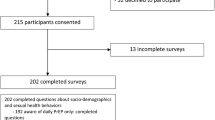Abstract
Aim/Objective
To assess the knowledge and practices of health care providers towards high-risk groups (HRGs) in order to maximize/better the services provided by health care workers to HRGs.
Methods
A cross-sectional study was conducted among 300 health care providers of various job categories involved in the TI program under TANSACS. The study included 100 NGO clusters; three health care providers per cluster were selected randomly and a semi-structured questionnaire was administered. Health care providers who were working in government hospitals for more than 3 months were selected.
Results
Out of 300 health care providers, 130 (43%) were aware of gender policy and 276 (92%) were aware of STI/RTI services. The majority of the study participants (90%) had good awareness of basic knowledge about HIV/AIDS, the TI program, condom demonstration, stigma and discrimination and high-risk groups. Study participants who were in the job profile that is closely associated with the patients demonstrated better knowledge of TI activities. Similarly, health care providers in the clusters that had a tertiary level care centre nearby as a referral centre were observed to have more knowledge than their counterparts. Poor knowledge on pre-exposure prophylaxis (14%) was noted among the study participants.
Conclusion
Knowledge gaps were identified among health care providers closely associated with HRGs. Continued training activities, especially for health workers in peripheral areas of the district, need to be undertaken to implement the TI program effectively.

Similar content being viewed by others

Abbreviations
- HIV:
-
Human Immunodeficiency Virus
- AIDS:
-
Acquired Immunodeficiency Syndrome
- WHO:
-
World Health Organisation
- TANSACS:
-
Tamil Nadu State AIDS Control Society
- HRG:
-
High-Risk Groups
- TI:
-
Targeted Intervention
- STI:
-
Sexually Transmitted Infections
- RTI:
-
Reproductive Tract Infections
- NGO:
-
Non-Governmental Organisation
- COVID:
-
Coronavirus Disease
- GoI:
-
Government of India
- ART:
-
Antiretroviral Therapy
- PLHIV:
-
People Living with HIV
- NACO:
-
National AIDS Control Organisation
- CBO:
-
Community Based Organisation
- MoHFW:
-
Ministry of Health and Family Welfare
- CGI:
-
Central Government of India
- SPSS:
-
Statistical Package for Social Sciences
- DSRC:
-
Designated STI/RTI Clinics
- ICTC:
-
Integrated Counselling and Testing Centres
- ORW:
-
Out Reach Worker
- HCP:
-
Health Care Personnel
- PHC:
-
Primary Health Centre
- GHQH:
-
Government Headquarters Hospital
- TI-PM:
-
Targeted Intervention – Project Manager
- HCTS:
-
HIV Counselling and Testing Services
- HEP B and C:
-
Hepatitis B and Hepatitis C
- HCW:
-
Health Care Worker
- PEP:
-
Post Exposure Prophylaxis
- BMWM:
-
Biomedical Waste Management
- SPS:
-
Social Protection Schemes
- DMLT:
-
Diploma in Medical Laboratory Technology
- PrEP:
-
Pre-Exposure Prophylaxis
References
Bhagavathula AS, Clark CCT, Sharma R, Chhabra M, Vidyasagar K, Chattu VK (2021) Knowledge and attitude towards HIV/AIDS in India: a systematic review and meta-analysis of 47 studies from 2010-2020. Health Promotion Perspectives. Tabriz Univ Med Sci. https://doi.org/10.34172/hpp.2021.19
Machowska A, Bamboria BL, Bercan C, Sharma M (2020) Impact of ‘HIV-related stigma-reduction workshops’ on knowledge and attitude of healthcare providers and students in Central India: A pre-test and post-test intervention study. BMJ Open 10(4). https://doi.org/10.1136/bmjopen-2019-033612
Muwonge TR, Nsubuga R, Ware NC, Wyatt MA, Pisarski E, Kamusiime B et al (2022) Health Care Worker Perspectives of HIV pre-exposure prophylaxis service delivery in Central Uganda. Front Public Health 2022:10
NACO India HIV estimates (2021) http://naco.gov.in. Retrieved 21 March 2023, from: https://naco.gov.in/sites/default/files/India%20HIV%20Estimates%202021%20_Fact%20Sheets__Final_Shared_24_08_2022.pdf
Selvaraj N, Vardhini H, Meenakshi R (2020) Assessment on knowledge and practice of postexposure prophylaxis of human immuno-deficiency virus among staff nurses and paramedical workers at a tertiary care hospital in South India. J Educ Health Prom 9(1):279
Timilshina N, Ansari MA (2013) Knowledge and attitude of basic health workers (BHWs) toward HIV/AIDS. J Nepal Health Res Counc 11(24):182–186. Retrieved 16 March 2023, from: https://pubmed.ncbi.nlm.nih.gov/24362608/
Yadzir ZHM, Ramly M, Suleiman A (2021) HIV-Related Knowledge, Attitude and Practice among Healthcare Workers (HCW) in Governmental Healthcare Facilities in Malaysia. International Online Medical Council (IOMC) 11(3):1–6. Retrieved 14 March 2023, from: https://www.iomcworld.org/open-access/hivrelated-knowledge-attitude-and-practice-among-healthcare-workers-hcw-in-governmental-healthcare-facilities-in-malaysia-66607.html
Acknowledgments
We would like to thank NACO and our Project Director, Mr. Thiru. T. N. Hariharan I.A.S.
Funding
Funding was received from the National AIDS Control Organisation (NACO).
Author information
Authors and Affiliations
Contributions
JM – Proposal Writing (Methodology), Project Approval, Data collection, Data analysis and Content writing
AM – Project Approval, Ethical Committee Approval, Data Collection
SD – Content Writing and Analysis
JB – Data Collection Compilation
KS – Data Collection Compilation
KG – Data Collection Compilation
KM – Data Collection Compilation
Corresponding author
Ethics declarations
Ethics approval and consent to participate
Ethical approval was waived by the local Ethics Committee of Government Ramanathapuram Medical College in view of the retrospective nature of the study and all the procedures being performed were part of routine care. The study was conducted in accordance with the declaration of Helsinki.
Consent for publication
Not applicable
Conflict of interest
All authors certify that they have no affiliations with or involvement in any organization or entity with any financial interest or non-financial interest in the subject matter or materials discussed in this manuscript.
Additional information
Publisher’s Note
Springer Nature remains neutral with regard to jurisdictional claims in published maps and institutional affiliations.
Rights and permissions
Springer Nature or its licensor (e.g. a society or other partner) holds exclusive rights to this article under a publishing agreement with the author(s) or other rightsholder(s); author self-archiving of the accepted manuscript version of this article is solely governed by the terms of such publishing agreement and applicable law.
About this article
Cite this article
Marimuthu, J., Alli, M., Subasri, D. et al. Knowledge, attitude and practices of health care providers in implementing services to HRGs under the TANSACS program. J Public Health (Berl.) (2023). https://doi.org/10.1007/s10389-023-02169-9
Received:
Accepted:
Published:
DOI: https://doi.org/10.1007/s10389-023-02169-9


